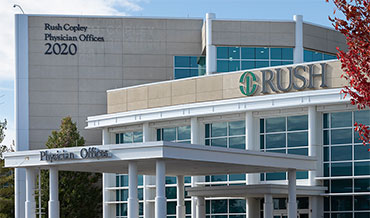What is Botox?
Botox is a brand name for botulinum toxin type A, which can be injected into the face to reduce or eliminate fine lines and wrinkles. Other similar products are available with brand names including Dysport, Xeomin and Jeuveau. Originally used by ophthalmologists to manage uncontrollable blinking and spasming of the eye and surrounding area, botulinum toxin type A temporarily blocks nerve signals to the muscles into which it’s injected. When a muscle can’t contract, the skin over it eventually smooths out. This process is often referred to as neuromodulation.
Most people tolerate the injections well, and the effects last approximately three months.
What Does Botox Treat?
Botulinum toxin injections can help treat a variety of neurological and medical conditions, including the following:
- Chronic migraine headaches
- Dystonia, a neurological disorder that causes severe muscle spasms and contractions
- Excessive drooling (sialorrhea) in adults with Parkinson's disease and other conditions
- Hyperhidrosis, or excessive sweating
- Jaw pain caused by hypertrophy of the masseter, one of the muscles you use to chew
- Overactive bladder
- Tourette syndrome
- Spasticity, an abnormal increase in muscle tone or stiffness
- Strabismus, or misaligned eyes
Rush dermatologists and cosmetic surgeons also use botulinum toxin to temporarily smooth facial wrinkles for cosmetic purposes.
How Neuromodulators Work
Botox and others have different properties that suit different needs and goals; your doctor will talk with you about which is right for you. Whichever you choose, the treatment with Botox takes less than 15 minutes. Pain is minimal, and your doctor will discuss pain relief techniques with you at the time of your visit. The effects of the treatment are generally noticeable as soon as 24 hours, sometimes taking up to 10 to 14 days for full effect.
Your doctor uses a very thin needle to inject small amounts of botulinum toxin type A into specific muscles, targeting them carefully to relax your wrinkles while preserving your natural facial expressions. The number of injections you need will depend on your facial features and the extent of your wrinkles. Crows feet, for example, usually need two to three injections, while furrows above your brow could take five or more.
Which Areas of the Face are Best for Neuromodulators?
Neuromodulators can be used to reduce the appearance of the following:
- Boxy or squared jaw
- Bunny lines around the nose
- Crows feet at the corners of your eyes
- Furrows in the forehead
- Gummy smile
- Lines around the mouth and chin
- Pebbled chin
- Vertical wrinkles between the eyebrows
How Soon Will You See Results With Neuromodulators?
You’ll see results in 24 to 48 hours and may notice continued improvement over the next few weeks. The injections last three to four months; you’ll have the best results if you schedule regular re-injections before the effects fully wear off.
Rush Excellence in Botulinum Toxin Injections
- System-wide expertise: Rush has many specialists who are experts in the use of botulinum toxin injections, including neurologists, physical medicine and rehabilitation specialists, dermatologists, craniofacial specialists and facial surgeons who are experts in making sure your injections improve function while also providing great aesthetic results.
- Top-ranked innovation and experience: Rush’s neurology program was the first in Chicago to offer patients botulinum toxin injections for neurologic conditions, and its specialists who administer the injections are some of the most experienced in the country. U.S. News & World Report ranks Rush University Medical Center among the nation's best for neurology and neurosurgery.
- Renowned dystonia experts: Botulinum toxin injections relax the excessive muscle contractions that cause dystonia and spasticity. The Rush Parkinson Disease and Movement Disorders Center is internationally known for its work in treating dystonia, and is home to the headquarters of the Dystonia Study Group, a national group of clinical dystonia experts.
- Comprehensive care: Facial surgeons at Rush provide the most comprehensive list of facial procedures in the Chicago area. If you need treatment in addition to your injections, such as a bite guard to reduce jaw pain, we have an expert orthodontist on staff.
Frequently Asked Questions About Botox
You won’t feel any numbness after injections. And your provider’s expertise in injecting the product — choosing the precise amount to be injected and using a delicate technique — mean that you’ll see natural-looking results.
There’s no right or wrong age. While almost everyone develops lines and wrinkles eventually, they show up in different people at different ages. When you begin to notice facial lines that remain when your face is at rest, that’s a good time to talk with your doctor about treatment.
Botox and Dysport injections can help relieve excessive sweating. They can also help slim the face when injected into the muscles you use to chew (masseter muscles). And in some cases, they can help improve sagging neck skin or vertical bands on the neck. Occasionally they can be injected to improve skin texture and quality, as well as reduce redness and flushing.
















